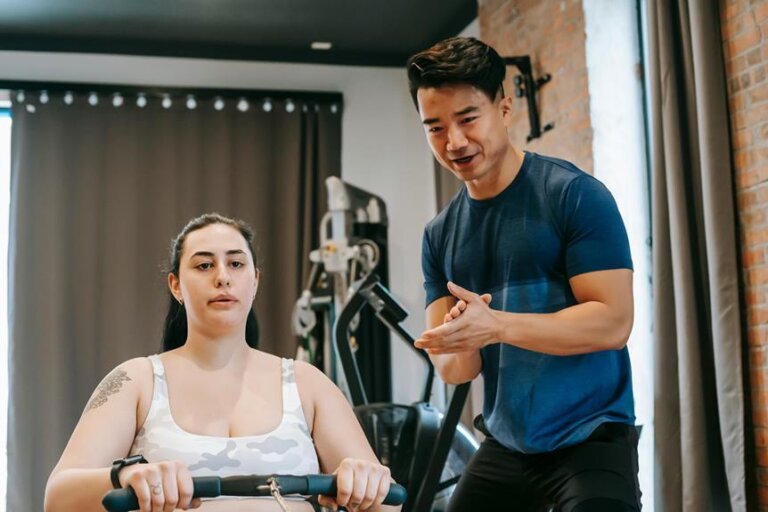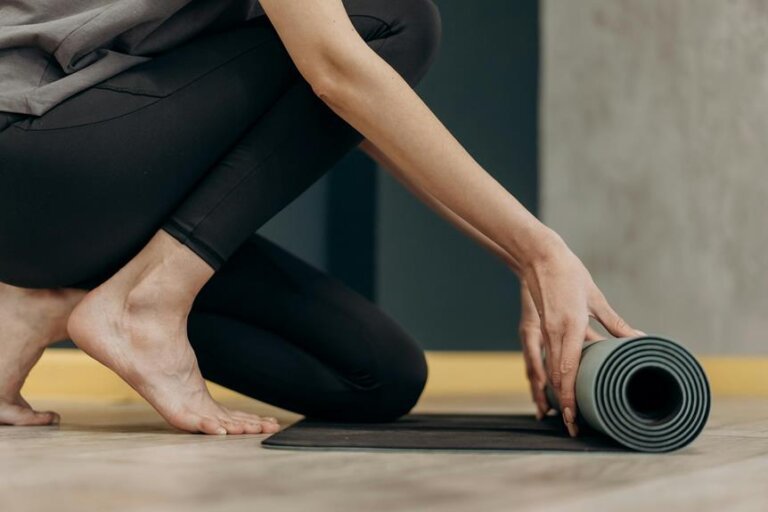The Mind-Body Connection: Understanding the Benefits of Yoga for Seniors
Imagine the intricate dance of a tree in the wind, its roots deeply grounded while its branches sway with grace and strength. Just like the tree, the mind-body connection in seniors is a delicate balance that can be nurtured through the practice of yoga.
Discover how each gentle stretch and mindful breath can not only benefit your physical well-being but also hold the key to unlocking a profound sense of vitality and peace in your golden years.
The journey towards a harmonious union of mind and body awaits your embrace.
Physical Benefits of Yoga for Seniors
Engage in yoga to experience improved flexibility, strength, and balance as a senior. Yoga poses focus on stretching and elongating muscles, which can help enhance your flexibility. Over time, you’ll notice increased ease in movements that were once challenging. This newfound flexibility can also contribute to better posture, reducing the risk of falls and injuries.
Moreover, yoga is a fantastic way to build strength, especially in your core muscles. Core strength is crucial for stability and supporting your spine. As you progress in your practice, you’ll find everyday tasks becoming more manageable, from bending to lift groceries to getting up from a chair with ease.
Additionally, the balance poses in yoga can significantly enhance your stability and coordination. These poses challenge your equilibrium, helping you improve your balance over time. Better balance not only prevents falls but also boosts your confidence in navigating various environments.
Cognitive Advantages of Senior Yoga
As a senior practicing yoga, you can experience cognitive advantages such as improved brain health, enhanced memory, and increased focus and clarity. These benefits not only contribute to your mental sharpness but also help in maintaining cognitive function as you age.
Brain Health Benefits
Enhancing brain health through regular senior yoga practice can lead to improved cognitive function and mental acuity. Engaging in yoga stimulates the brain by incorporating mindfulness, focus, and breath control. These elements work together to enhance cognitive abilities such as memory, attention, and processing speed.
The physical aspect of yoga also plays a role in brain health, as it improves blood circulation, delivering more oxygen and nutrients to the brain. Additionally, the relaxation and stress-reducing benefits of yoga can help lower cortisol levels, which in turn can prevent cognitive decline.
Memory Enhancement Potential
Improving brain health through regular senior yoga practice can significantly enhance memory function and cognitive abilities. Yoga helps seniors by reducing stress and anxiety levels, which can otherwise impair memory retention.
The mindful breathing techniques and meditation practiced in yoga sessions promote relaxation and focus, contributing to improved memory recall. Additionally, the physical postures and movements in yoga increase blood flow to the brain, stimulating neural connections and enhancing cognitive function.
As a result, seniors who incorporate yoga into their routine may experience enhanced memory retention, better concentration, and overall sharper mental acuity. Engaging in yoga regularly can be a valuable tool for seniors looking to maintain and even improve their memory and cognitive skills as they age.
Focus and Clarity
Regular practice of senior yoga can sharpen your focus and clarity, providing cognitive advantages that contribute to overall mental acuity.
As you flow through yoga poses, your mind learns to concentrate on the present moment, enhancing your ability to focus on tasks throughout the day.
The controlled breathing techniques in yoga help calm your mind, reducing mental clutter and enhancing clarity of thought.
This increased focus and mental clarity can lead to improved decision-making, problem-solving, and overall cognitive function.
Emotional Well-being Through Yoga
Discover how yoga can help you find relief from stress, elevate your mood, and cultivate inner peace.
By incorporating yoga into your routine, you can experience a sense of calmness and emotional well-being that enhances your overall quality of life.
Let’s explore how these practices can positively impact your mental and emotional health.
Yoga for Stress Relief
One effective way to enhance your emotional well-being through yoga is by incorporating stress-relieving poses and breathing techniques into your practice.
Poses such as Child’s Pose, Cat-Cow, and Legs Up the Wall can help release tension in your body and calm your mind. Deep breathing exercises, like diaphragmatic breathing or alternate nostril breathing, can activate the relaxation response and reduce stress levels.
Mood Elevation With Yoga
Enhance your emotional well-being and uplift your mood through the practice of yoga by incorporating mood-elevating poses and mindfulness techniques.
Yoga can help release tension and stress stored in the body, leading to a sense of lightness and ease.
Poses like the Bridge Pose, Cobra Pose, and Tree Pose can stimulate the release of endorphins, the body’s natural feel-good hormones, promoting a sense of happiness and well-being.
Additionally, mindfulness techniques such as deep breathing, meditation, and body scan exercises can help you stay present in the moment, letting go of negative thoughts and enhancing your overall mood.
Yoga for Inner Peace
Improve your emotional well-being and find inner peace through the practice of yoga. Yoga offers a holistic approach to emotional wellness, helping you manage stress and cultivate a sense of calmness.
By focusing on deep breathing and mindful movements, yoga can enhance your self-awareness and emotional resilience. Through regular practice, you can learn to let go of negative emotions, release tension stored in the body, and promote a positive outlook on life.
The meditative aspects of yoga encourage introspection, allowing you to connect with your inner self and find peace amidst life’s challenges. Embracing yoga as a tool for emotional well-being can lead to a more balanced and harmonious state of mind, fostering a sense of inner tranquility that permeates your daily life.
Improving Balance and Flexibility
How can yoga help you become more balanced and flexible as a senior?
As you age, maintaining balance and flexibility becomes increasingly important to prevent falls and stay mobile.
Yoga offers a gentle yet effective way to enhance these essential aspects of physical health.
Yoga poses focus on stretching and strengthening muscles, improving your overall flexibility. By regularly practicing yoga, you can increase the range of motion in your joints, making daily activities easier and reducing the risk of injuries.
The slow and controlled movements in yoga also help build stability and balance by engaging various muscle groups that support your core and posture.
Additionally, the mindfulness and concentration cultivated during yoga practice can enhance your proprioception – your body’s awareness of its position in space. This heightened awareness can further aid in improving balance and coordination, allowing you to move with more confidence and grace.
Incorporating yoga into your routine can lead to noticeable improvements in your balance and flexibility, helping you maintain independence and vitality as you age.
Yoga for Stress Reduction in Seniors
Exploring the calming practice of yoga can significantly reduce stress levels for seniors, promoting overall well-being and relaxation. As seniors age, they may encounter various stressors such as health concerns, loss of loved ones, or changes in living situations. Engaging in yoga can provide a holistic approach to managing stress by incorporating breathing exercises, mindfulness, and gentle movements.
Yoga encourages seniors to focus on the present moment, letting go of worries about the past or future. The practice promotes relaxation by activating the parasympathetic nervous system, which helps counteract the body’s stress response. Through regular practice, seniors can cultivate a sense of inner peace and calm that transcends into their daily lives.
Moreover, yoga offers seniors a safe space to release tension held in the body, improving flexibility and reducing physical discomfort associated with stress. By fostering a mind-body connection, seniors can better understand and manage their stress levels, leading to improved overall quality of life.
Social Connections and Community in Yoga
Engaging in yoga classes can foster meaningful social connections and a sense of community among seniors practicing together. The shared experience of learning new poses, focusing on breath work, and supporting each other in the practice creates a bond that goes beyond the physical aspect of yoga.
In a yoga class, you have the opportunity to interact with like-minded individuals who share a common interest in health and well-being. These interactions can lead to friendships that extend beyond the studio, providing a support system outside of the class.
Being part of a yoga community can also combat feelings of loneliness and isolation that some seniors may experience. By coming together regularly to practice yoga, you’re surrounded by a group of individuals who are there to encourage and uplift each other.
The sense of belonging that comes from being part of a community can have a positive impact on your mental and emotional well-being. So, next time you step onto your yoga mat, remember that you aren’t just practicing alone – you’re part of a supportive network of fellow seniors on a journey to better health and connection.
Frequently Asked Questions
Can Seniors With Physical Limitations Still Participate in Yoga and Experience Benefits?
Yes, seniors with physical limitations can still benefit from yoga. Modifications and gentle movements can be tailored to accommodate individual needs, promoting strength, flexibility, and relaxation. Consistent practice can enhance well-being and overall quality of life.
How Does Yoga Specifically Impact Cognitive Decline in Seniors?
Like a gentle rain nourishes parched soil, yoga cultivates mental clarity and resilience in seniors, counteracting cognitive decline. By promoting focus, relaxation, and mindfulness, yoga strengthens neural connections and fosters brain health.
What Emotional Challenges Can Yoga Help Seniors Overcome?
Yoga can help you overcome emotional challenges like stress, anxiety, and depression. By practicing regularly, you can improve your mental well-being, increase relaxation, boost self-esteem, and cultivate a more positive outlook on life.
Are There Specific Poses or Techniques That Seniors Can Focus on to Improve Balance and Flexibility?
When looking to boost balance and flexibility, focus on yoga poses like tree pose and cat-cow stretch. These movements can improve stability and range of motion, helping you feel stronger and more agile in your daily activities.
How Does Practicing Yoga Help Seniors Manage Stress on a Daily Basis?
Practicing yoga helps you manage stress daily by promoting relaxation through breathing techniques and mindful movements. It encourages a calm state of mind, reduces tension in the body, and fosters a sense of well-being.
Conclusion
In conclusion, practicing yoga as a senior won’t only improve your physical health, but also sharpen your mind, boost your mood, enhance your balance and flexibility, and reduce stress.
It’s like a magical elixir that transforms your body and soul, leaving you feeling like a rejuvenated and invincible warrior ready to take on the world.
So grab your yoga mat, breathe deeply, and let the transformation begin!




